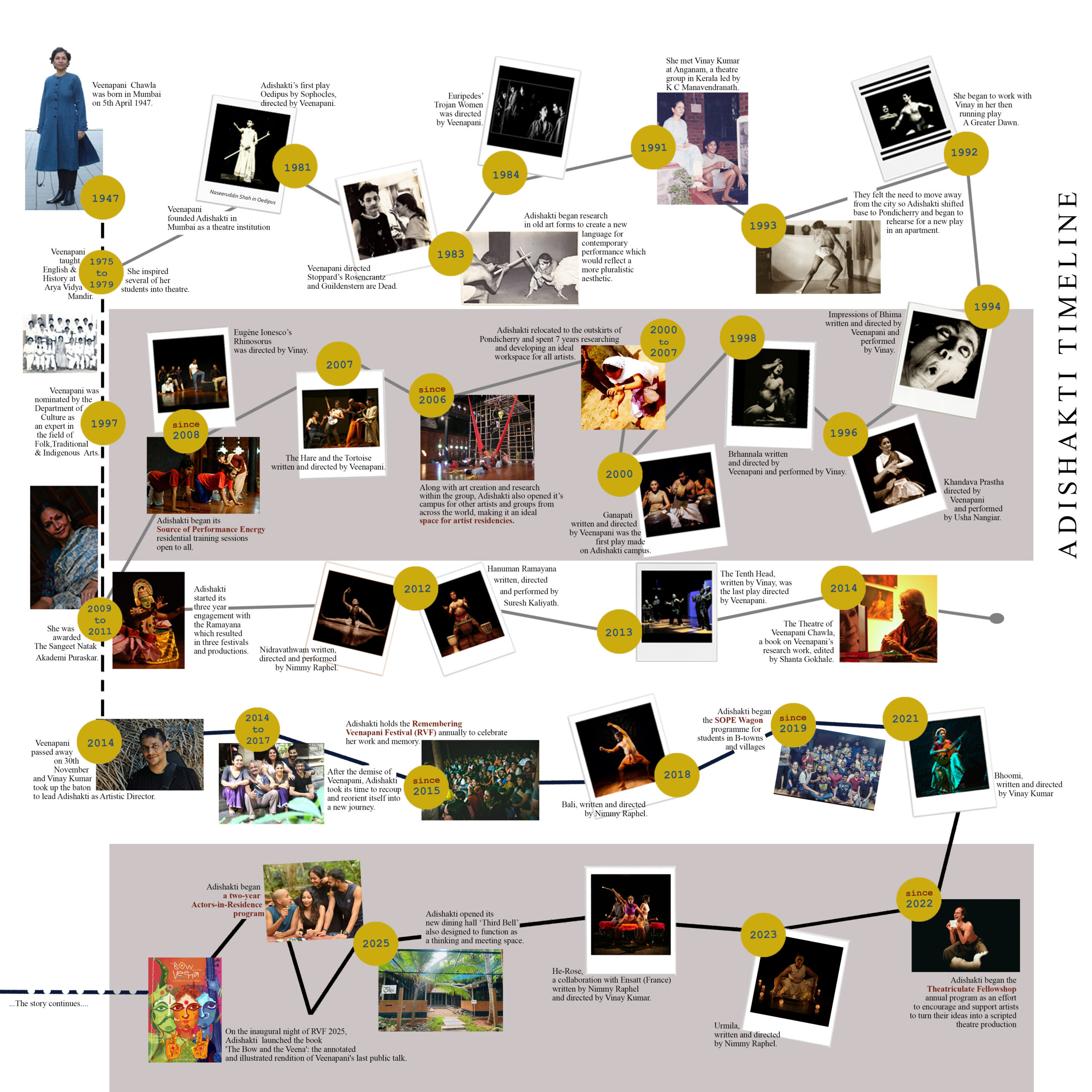About Us
Adishakti Laboratory for Theatre Art Research is a contemporary theatre research and repertory company near Pondicherry, India. We create theatre performances and engage in performance research which enables us to develop our unique theatrical language. We disseminate these research findings through residential workshops to people in varied disciplines. Adishakti reaches out to other performance groups, artists and ideators to evolve their own workshops, residencies, retreats, seminars and performances in our space that encourage hybrid expression.
In 1989 Adishakti was registered as Adishakti Laboratory for Theatre Art Research (ALTAR) Public Charitable Trust (Registration No: 50913 Date: 27.12.1989) in Delhi, so that it could function on an all-India basis, belonging to no specific region but able to root itself freely anywhere in the country.
A BRIEF HISTORY OF ADISHAKTI
Adishakti was created in 1981 as a theatre company in Mumbai.
At which point Adishakti was working with existing scripts and translating them into performances. Some of these performances were Sophocles’ Oedipus (1981), Stoppard’s Rosencrantz and Guildenstern are Dead (1983), and Euripedes’ Trojan Women (1984).
» more
In 1983 Adishakti started to include research as a part of its activities. This emerged out of its need to create a new language for contemporary performance, which would reflect a pluralistic aesthetic. The initial areas of such research were certain traditional Indian knowledge systems contained in forms like Koodiyattam, Dhrupad singing, Kalaripayattu, Asanas, Pranayama, Samavedic Chanting married to voice training and other performance techniques from the West; viz; Eugenio Barba’s Odin Theatre in Holstebro Denmark and the Royal Shakespeare Company, UK.
From 1990 onwards Adishakti started creating its own texts. Thus A Greater Dawn (1992), Impressions of Bhima (1994), Khandava Prastha (1996), Brhannala (1998), Ganapati (2000), The Hare and The Tortoise (2007), Rhinoceros (2008), Nidrawathwam (2011), The Hanuman Ramayana (2011), The Tenth Head (2013). Each of these were interpretations of given traditional texts and reflected an aesthetic, which sought to build bridges between disparate ways of viewing particular themes.
In 1989 Adishakti was registered as Adishakti Laboratory for Theatre Art Research (ALTAR) Public Charitable Trust (Registration No: 50913 Date: 27.12.1989) in Delhi, so that it could function on an all-India basis, belonging to no specific region but able to root itself freely anywhere in the country.
In 1993 Adishakti shifted base to Pondicherry. And it was from this point onward that its concerns became larger. It was no longer preoccupied merely with the development of its own theatrical language and of revitalising contemporary theatre but also in offering something to the traditional artist; its partner in dialogue. In fact Adishakti’s relationship with traditional form from this time onwards was a departure from the existing practice of treating such forms as hermetically sealed, or only as the object of preservation and restoration. Adishakti started acting on the premise, that past disciplines need to be deliberately displaced from their own context in order to throw up a range of new elements within them, not formerly known or apprehended. Adishakti regarded such disciplines as constitutively incomplete, and attributed, in part, some of their fading appeal, within their own spectator-communities, not so much to the corruption (through urbanization etc.) of audience taste, but rather, to the historical attrition or paralysis of the forms themselves. Within this understanding, Adishakti’s position was that the contemporary performer was privileged as a critic whose task it was to reinterpret and, as it were, fill in the blanks within specific traditional forms. So, in its encounter with the traditional artist, Adishakti endeavoured, of course, to clarify its own formal and imaginative directions, but also, and equally, to stimulate the traditional artist to discover old forms anew. The encounter, thus, was premised upon a powerful recognition of mutual worth and capability.
Below are mentioned some of these programmes with traditional artists, which benefited their practice:
Around this time, Adishakti’s performance praxis, the work on which was initiated in 1983, reached maturity. And there emerged a clear vision of Theatre as a synaesthesis of other arts; or a summative art. And Adishakti’s theatre productions now consciously used the other arts as signifiers of meaning rather than merely as decorative elements. For Adishakti believes that if live performance has to remain valid as an art form, it must reflect the protean nature of the contemporary perception of truth and reality in its form and in its content. It must try to bring out the simultaneity of its multiple-sightedness, its tangled dynamism, through the very form and structure of the expression. It believes this can best be done by employing as many modes of expression as possible to act as texts or as signifiers of content within a totality that would be a formal metaphor.
This aesthetic pluralism, which gives sovereignty to all the modes of expression – the word, the image, the sound, etc., is a reflection of the pluralism of the contemporary world, its multiple sightedness. For the contemporary mind can take in more viewpoints than one – even contrary ones – at the same time. It can see the same thing from all angles and distances
In 2000 Adishakti relocated itself to the outskirts of Pondicherry. From this year Adishakti extended its research activity into disciplines such as old construction technologies, traditional medicine, environment protection for a healthy eco system and instrument building. It was the pragmatic needs of the hour, (that of creating the infrastructure on its campus) which compelled the company to undertake these investigations and they merely reinforced Adishakti’s growing awareness that knowledge creation is a crucial exercise for new creativity.
In 2003 Adishakti began to curate it’s Winter Workshop. This programme brought together a Koodiyattam performer, a Noh performer, poets, musicians, cultural psychologists, philosophers, film makers, actors – so as to investigate how each of these, views or uses, ‘breath’ as a source of expression. And continuing this impulse Adishakti from 2008 onwards has started creating the opportunity at its campus, for new and imaginative exchanges between epic texts and contemporary interpreters like historians, cultural psychologists, sociologists and performance; between film and live performance; between live performance, painting and music.
The objective of this three-year programme was to:
A) Provide the traditional / folk/ contemporary performer with a new approach to an old text and thereby compel her to recreate her performance language, making it aesthetically accessible to a contemporary world.
B) Release new knowledge and rescue an old cultural symbol from being suffocated by “purism”.
Today from out of this programme have emerged three Adishakti Productions: Nidrawathwam, The Hanuman Ramayana, and The Tenth Head. Two others evolved, Sita and Luv & Kush.
Participants learn breath and emotion techniques with Vinay Kumar at one of Adishakti’s first Source of Performance Energy workshops, conducted in January 2008.
In 2008 Adishakti launched its training workshops. Over the years the performance craft evolved under the leadership of Veenapani Chawla, had matured into an alternative methodology of performance. The performers at Adishakti started teaching young and mid-career professionals from across the country and around the world through these ten-day sessions. Today Adishakti conducts six such workshops annually.
In 2014 much to the shock of the entire theatre community, Adishakti lost their teacher and founder, Veenapani Chawla. Shortly after, Vinay Kumar, the company’s leading researcher and performer took the responsibility to shepherd the way. He became Artistic Director.
From 2015 onwards Adishakti began to celebrate the Remembering Veenapani Festival every year. During the festival the company had opened doors to performances varying from music to dance and theatre. Adishakti since has also extended its space to a number of residencies, workshops and performances that are conducted by several artists from across the globe.
In 2018 as a result of the rich cultural exchange during the Ramayana Festival and Winter workshop, a new production Bali came to play. The play is written and directed by Nimmy Raphel. Here, the writer has tried to explore the notion of right or wrong through its various characters. Through this play, we explore how one evaluates this notion and, how it can change when each and every character is given an opportunity to voice thoughts and opinions.
» less
Adishakti consistently strives to create a safe workplace for everyone.
In accordance with the Sexual Harassment of Women at Workplace (Prevention, Prohibition and Redressal) Act, 2013, a Prevention of Sexual Harassment (POSH) Internal Committee (IC), comprising staff members and an external expert consultant is created.
» more The current POSH Internal Committee comprises the following members: Adishakti also organises sessions on raising awareness of and for prevention of sexual harassment at workplace, for its staff through the year. We have zero tolerance towards sexual harassment and it endeavours to prevent, prohibit and redress sexual harassment at work in accordance with the prevailing laws. Any aggrieved person may lodge a complaint with regards to sexual harassment with the Presiding Officer or with any member of the POSH committee as constituted above at the following email: adishaktiposh@gmail.com » less
“The answer is in being hybrid; to nurture old knowledges but also to always be pluralistic – not to be conditioned by positions and ideologies”
– Veenapani Chawla

Our Guru, our light.
Recognised as one of the pioneers in experimental theatre in contemporary India, Veenapani Chawla had long been engaged in creating a unique form of performance methodology. A self-taught artiste, she evolved a new language of theatrical practice that fuses traditional and modern aspects of life and theatre.
Her belief in plurality helped her move beyond earlier notions of what theatre should be and demonstrate what theatre could be. The culmination of which led to the founding of Adishakti Laboratory for Theatre Arts Research in Pondicherry.

Vinay Kumar is the Artistic Director of Adishakti leading the team in its quest for continued in-depth research, new performance creation and inculcation of Adishakti’s methodology amongst new generations of actors.
Primarily, Vinay is an actor who also a writer, director, light and sound designer, choreographer and composer. Currently he is also one of the most sought after teachers of performance craft.
For Vinay theatre became a way of life since early childhood. Hectic street performances were the norm. School was too dull for him compared to the lure of the stage.
» more
Feeling the need for some formal training, Vinay joined the School of Drama, Kerala where he excelled in Performance and direction. In the midst of this journey, he was working with a theatre group in Kerala which started collaboration with Veenapani Chawla. In his interactions with her he found that his own explorations were aligned with hers so began Vinay’s engagement with Adishakti since its early years.
To embellish the tools available to contemporary performers, Vinay along with Veenapani, started researching into the use of breath, voice and centres in the actors body. This led to the evolution of a unique performance methodology which Vinay shares to this day in his direction and his teaching.
His milestones:
- An alumnus of school of drama Kerala
- Trained in Kathakali under guru Krishnan Namboodri
- Recipient of the Amrish Puri award for acting.
- Senior fellowship from the ministry of culture, New Delhi in the field of theatre
- Recipient of various other fellowships including the APEX fellowship
- Collaborated with international artists such as Musician- Paul Dresher, Chinese Peking Opera director- Chen Zhi Zhen and Filmmaker- Lucia King.
- Has been the lead actor in most Adishakti productions: Savitri, Impressions of Bhima, Brhannala, Ganapati, The Hare and the Tortoise and The Tenth Head, directed by Veenapani), and Bali directed by Nimmy Raphel.
- Directed the Adishakti production, Rhinoceros.
- Scripted the Adishakti production, The Tenth Head.
» less
The Adishakti team is a closely knit community of performers who live together and work together. They form the backbone of the community. Besides their performance practice, the team doubles up as technical support, assists in administration and communications, helps on the land and takes care of guests and visiting performers. The team hailing from diverse backgrounds makes for a vibrant synergy.

NIMMY RAPHEL
Managing Trustee & Resident Actor
If you would like to visit us, collaborate with us or invite us, please feel free to contact her.
Nimmy trained in the dance forms; Mohiniyattam and Kuchipudi dance in Kerala Kalamandalam from 1995-2001 which she has performed all over India. She is currently a resident actor, dancer and musician at Adishakti, practicing its methodology of theatre since 2001.
» more
» less

ARVIND RANE
Resident Actor
Arvind Rane has a BA in Economics & Politics from Mumbai University. He has been Creative Supervisor in Advertising Agencies like Shilpi, O&M, Ulka, Contract, Lintas and RK Swamy from 1981-1997, while he was in Mumbai. Concurrently he was with Adishakti during its Mumbai phase from 1981 to 1992. He rejoined Adishakti in 1998. He is currently a senior resident performer in Adishakti and is also in charge of Adishakti’s Public Relations.
» more
Arvind has performed with Adishakti in Brhannala, Ganapati and Bali at various venues both national and international. He also performs in Adishakti’s The Hare and The Tortoise and Rhinoceros. From 2008 he was part of the team which performs in Impressions of Bhima. Arvind disseminates Adishakti’s method of linking performance to rhythm through workshops held at Adishakti. Arvind is one of the cast members of Adishakti’s latest play Bhoomi.
» less
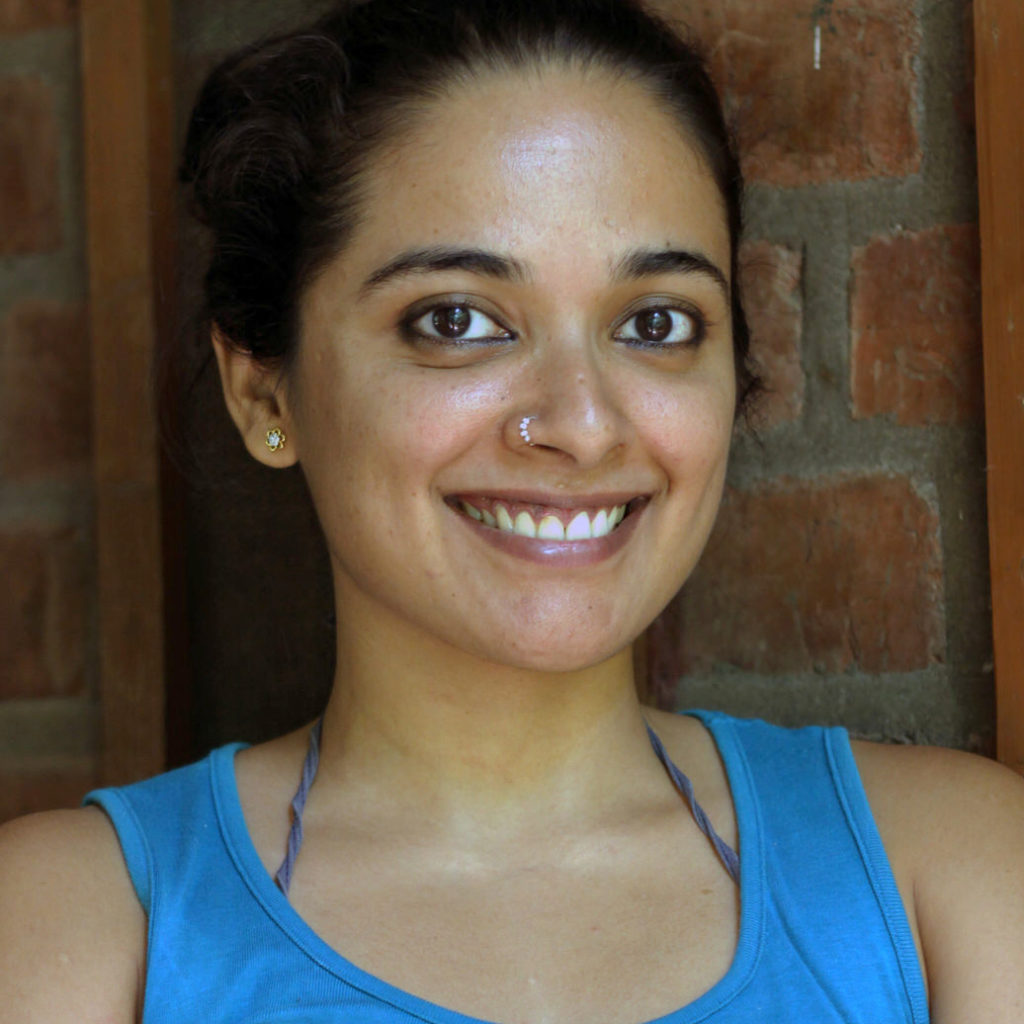
Ashiqa Salvan
Ashiqa Salvan has a Bachelor’s in Mass Media from Mumbai University. She briefly worked in Ogilvy as an Account Executive in Bangalore before finding herself drawn to theatre. She has been a theatre practitioner since 2009. Ashiqa has traveled extensively with theatre troupes she worked with. Some of the troupes she has been a part of as actor include; Perch, Jagriti ART productions, Sandbox Collective.
» more
She is one of the musicians in Brhannala. Ashiqa is one of the actors in two of Adishakti’s latest plays, Bali and Bhoomi,
» less

Kiyomi Mehta
Kiyomi Mehta, an Inlaks theatre scholarship awardee, has been associated with Adishakti since 2016 and currently is one of the cast member’s in Bali. She has also acted and doubled up as a production manager for plays directed by Atul Kumar, Kalki Koechlin, Kaizaad Kotwal, Gagan Riar.
» more
» less
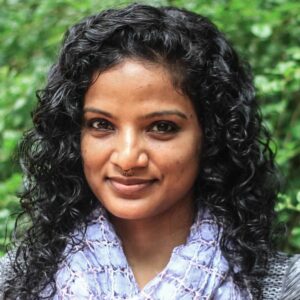
Meedhu Miriyam
Meedhu , an alumini of Asian College of Journalism, Chennai, started her career as a Journalist with The Hindu, for which she covered extensively on school education, arts, theatre and culture. She briefly worked with The Lewis Foundation of Classical Ballet, Bangalore in Public Relations and as program co-ordinator for their annual ballet productions and outreach programs for underprivileged children.» more
» less
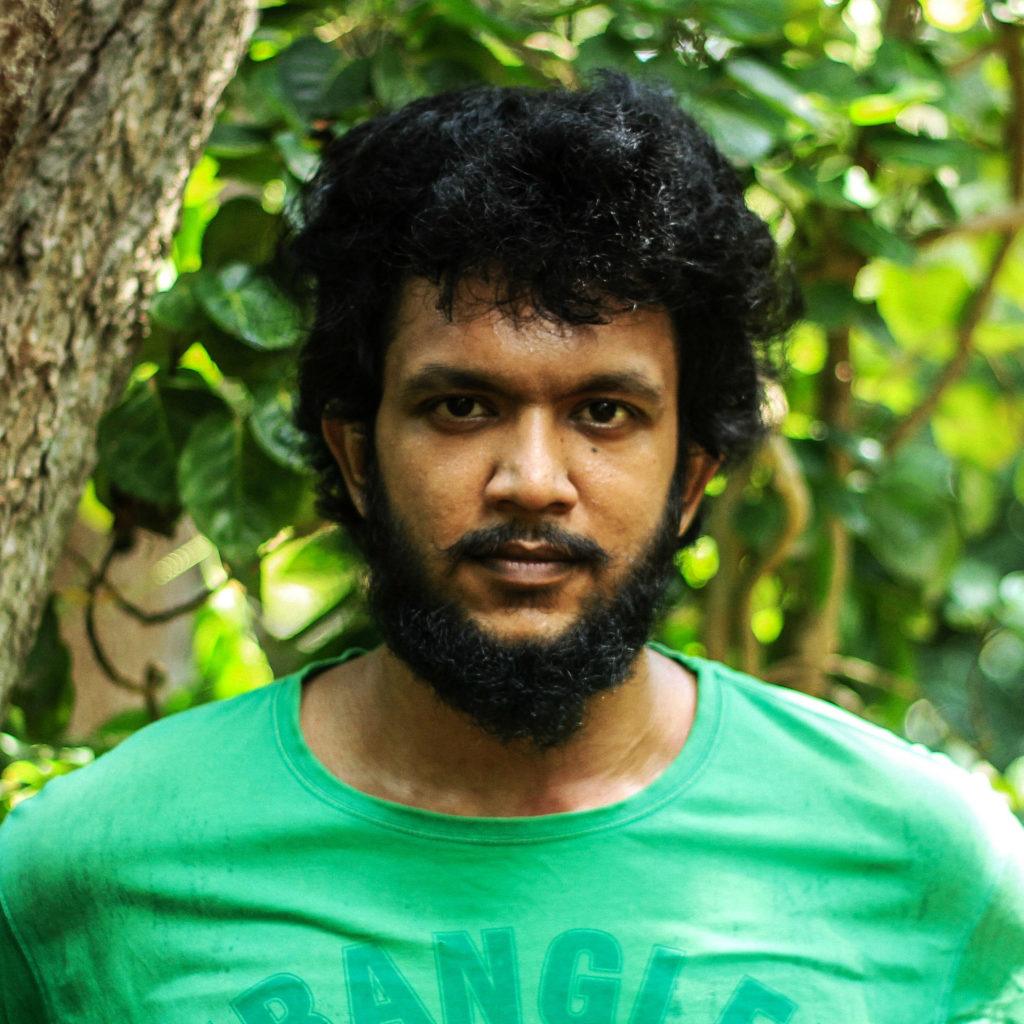
Sooraj S
Sooraj is a performer, juggler and percussionist. Has a degree in history from Ambedkar University Delhi 2019. Sooraj has formally trained as a dancer with Jaan R Freeman of the Freeman Repertory of the states. This resulted in a showcase with Freeman 2014. He has since, been a freestyle dancer doing movement choreography for productions and dance pieces. He has worked as an editor of catalogue books for IDFFK (International Documentary Film Festival Kerala) in 2017 and 2018.
Sooraj moved to Adishakti to train in 2018. » more He disseminates notions of bridging rhythm and performance in the language of played rhythm in Adishakti’s SOPE sessions. He has given voice for advertisement industry and also has worked in training director B Jayashree’s actors for Spandana Theatre’s production “Parijata”. » less

Sudeep Srivastava
is a veteran HR professional: a practitioner earlier within organisations he is now a consultant & teacher. He has relocated from Mumbai to Pondicherry. He has been associated with Adishakti for over 25 years, first as an actor and then as a trustee. But most importantly as a well-wisher. He plays the tabla with as much dedication as he puts into all his endeavours.

Sathya Saran
is a writer, journalist and teacher who believes in the good work that Adishakti is doing, carrying forward Veenapani’s legacy.

Rajeev Sethi
is South Asia’s leading designer and is noted internationally for his innovative contribution to preserving and celebrating the subcontinent’s rich cultural heritage. For more than 35 years, through his work in design and architecture, performances and festivals, exhibitions and publication, policy and program, he has identified ways to bring contemporary relevance to traditional skills of vulnerable artisan communities and creative professionals.
» more
» less

Chandrika Grover Ralleigh
is an arts administrator and a cultural strategist. After founding Pro Helvetia – Swiss Arts Council’s first liaison office in Asia she has been Trustee with Adishakti, Advisor Kochi-Muziris Biennale 2018, Hony Advisor with VIMOR Handloom Foundation, Artistic Codirector of PECDA 2021/23 and Managing Trustee of the Asia Art Archive in India.

Rathi Jafer
With over 10 years of experience in conceptualizing, managing and monitoring the delivery of large-scale education and arts projects involving diverse groups in South India, South Asia, the UK and more recently, South Korea, Rathi has an abiding interest in intercultural dialogue and the development of cultural competence as an critical skill that connects and empowers people worldwide.
» more
» less

Sunam Mukherjee
Sunam is a disciple of The Mother and Sri Aurobindo. He was born in Pondicherry. He works in the Ashram Press and in the Sri Aurobindo International School, Pondicherry.

Indu Gandhi
Indu was born in West Punjab, brought up in Mumbai and Delhi. She holds an M.A in philosophy from the Delhi University. She taught at the Miranda House, Delhi for 35 years. She currently lives with the Adishakti core team on campus.
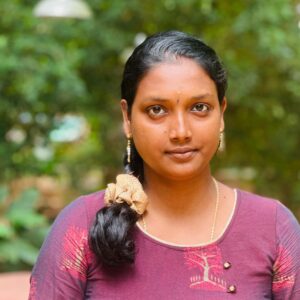
Praveena
Acountant
Praveena was born and raised in Chennai and currently resides in Pondicherry. She holds a Bachelor’s degree in Commerce, which she completed in 2014. She began her professional journey over 13 years ago, starting in administrative roles and gradually progressing into accounting.
Throughout her career, she has gained valuable experience across various domains of finance and administration. Since 2023, she has been working with Adishakti, contributing to our operations with her skills in accounting and administrative management.

Shanty Shyam Sundar
House Keeping Manager
Shanthy joined Adishakti in 2007. She holds a High School Diploma.
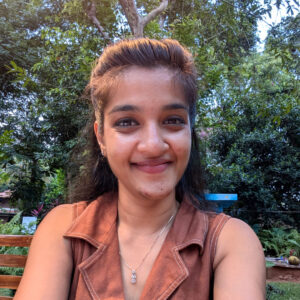
Paridhi Bihani Dugar
Arts and Resource Manager
Paridhi is a Movement Artist, Arts Manager, Producer, and Theatre Enthusiast with expertise in multiple dance forms such as Kalaripayattu, Kathak, and Contemporary. She has taught at multiple universities as a contemporary dance teacher, performed with many well established choreographers in India and abroad. Along with teaching and performing, Paridhi also believes in supporting the Artists community by producing and coordinating projects for them.
Paridhi holds a B.E in Computer Science and a National Diploma in Movement Arts and Mixed Media from the Attakkalari Centre for Movement Arts, Bangalore.

